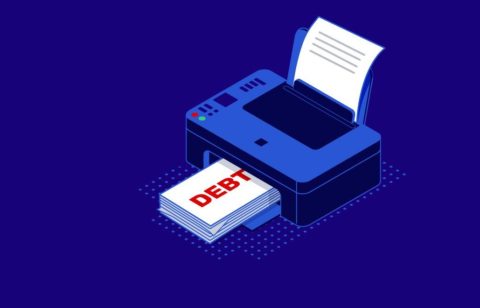
If you’ve made the decision to consolidate your debt, then you know what you want. You want a single, more affordable monthly payment, lower interest rates, and a faster payoff than you’d be able to afford on your own.
However, you might not know exactly where to go to get your debt consolidation loan. There are many different options and types of loans out there, and figuring out what’s right for you can be tough.
To make things simpler, we’ve broken down four of the most popular sources of debt consolidation loans. Learn more about balance transfer credit cards, personal loans, home equity loans, and 401(k) loans to determine which method of debt consolidation best fits your situation.
Balance transfer credit card
Balance transfer credit cards are a common method for consolidating smaller amounts of debt into a single, easier-to-manage monthly payment.
With this method, you apply for a credit card with a promotional 0% interest rate, and then transfer the balances of your other debts over to the new card. This transfer freezes the accumulation of interest for as long as the promotional interest rate lasts, making it easier to pay down debt aggressively.
Pros
By far, the most significant benefit to opening a balance transfer credit card is the freezing of the accumulation of interest. Since no interest compounds on your balance, every dollar you pay to the credit card company goes toward eliminating your debt.
Ideally, even after the promotional interest rate ends, your new card will have more favorable terms than your old card. That might mean a more forgiving interest rate, a more robust rewards program, or other benefits.
Finally, like all other forms of debt consolidation, balance transfer credit cards reduce your debt to a single monthly payment that’s easier to keep track of and ideally more affordable.
Cons
Balance transfer credit cards are not risk-free. If you aren’t able to pay off the entire balance before the promotional period ends, you might end up with a new, unwanted credit card that makes your debt problems more complicated than they were before.
Balance transfer cards also often come with a transfer fee. While this fee will likely represent a fraction of your total debt, you should be aware of it before you agree to any transfer.
On top of that, opening a new credit card can hurt your credit, even if you’re only applying for that card to get out of debt. Be wary of this potential damage to your credit score, especially if you plan to seek a major loan in the near future.
Finally, balance transfer credit cards can lead to an irresistible temptation to spend on credit. After transferring your balances, you’ll open up a significant amount of free credit on the rest of your cards. If you can’t resist the urge to use this credit, then you’ll end up running your balances back up, putting yourself in a worse position than you were when you started.
Personal loan
Applying for a personal loan from a traditional lender is a popular debt consolidation method for a reason. By using this loan to pay off all your debts at once, you roll your debts into a single monthly payment. It’s a simple, straightforward way to consolidate debt.
Pros
Like other forms of debt consolidation, paying off your debts with a personal loan allows you to make a single monthly payment that’s ideally more affordable than what you were paying before. Compared to most credit cards, personal loans tend to have much lower interest rates as well. This means that you’ll pay less over the lifetime of your debt than you would otherwise.
Personal loans also allow you to consolidate higher amounts of debt than a balance transfer credit card generally would. While credit card companies might only approve you for a balance transfer limit of a few thousand dollars, lenders are free to offer you much more if they deem you a good investment.
Con
Personal loans can be extraordinarily difficult to get if you have bad credit. Since high levels of debt and bad credit often go together, many people who truly need debt relief are unable to secure the consolidation loans that could help solve their financial problems.
Personal loans can also be a risky form of debt consolidation. If you can’t keep up with your payments, you’ll be putting your credit score and your financial future at risk. In addition, if you can’t resist accumulating more debt as you pay down the loan, then the consolidation process won’t do you much good in the end.
Home equity loan
Homeowners have the option to take the equity that they’ve built in their homes and use it to consolidate their debts. If you’re a homeowner, then borrowing against your home’s equity is at least worth looking into.
There are two similar but separate ways to use home equity to consolidate debt. You can either take out a loan with a fixed interest rate or open up a home equity line of credit with a variable interest rate, much like a credit card.
How much debt can you consolidate with home equity? It depends on how much of your mortgage you’ve already paid off as well as the value of your home. The amount of equity you have is the difference between the appraised value of your home and the total balance of your mortgage.
While home equity loans can be a godsend for homeowners in debt, they come with their share of drawbacks, too.
Pros
Home equity loans often have much lower interest rates than standard personal loans do. That’s partially because they have longer repayment periods, but mostly, it’s because home equity loans are secured by your home. With your home as collateral, lenders are able to offer you much more favorable terms than they would otherwise.
Unlike personal loans, home equity loans don’t require you to have great credit in order to lock down the loan. As long as you’ve built up equity in your home, you should be able to access a loan or line of credit to consolidate your debt.
Cons
Home equity loans tend to have much longer repayment periods than most other forms of debt consolidation do. Generally, you’ll be paying back your home equity loan for at least 10 years. This lengthy repayment period can be a financial hassle and can lead to you paying more on your loan over time than you might otherwise.
The most significant drawback of tapping into home equity to consolidate your debt, however, is the fact that you must put your home up as collateral in order to access the equity. In simplest terms, that means that if you can’t keep up with the payments on your loan, you’ll be in danger of losing your house.
Finally, and most obviously, home equity loans are only available to homeowners. If you don’t own a home (or if you haven’t yet built up enough equity in your home), you won’t be able to access this form of debt consolidation.
401(k) loan
Taking out a loan from your retirement can be a tempting strategy, but it’s rarely the best option for debt consolidation. Still, it has its place and is worth considering if other options haven’t panned out for you.
Most 401(k) plans have provisions that allow employees to borrow up to half of their total retirement savings to repay over the course of five years. Payments go back into the 401(k) account, interest and all.
While the thought of borrowing from your future self may seem simple and attractive, taking out a 401(k) loan to consolidate debt can be harmful to your finances in the end in many cases.
Pros
401(k) loans have much lower interest rates than most other forms of debt do, especially credit cards. These rates are usually slightly higher than the “prime rate,” which is what banks charge their biggest and best customers.
Some people also like the thought of borrowing from themselves and cutting out third-party lenders entirely from the debt consolidation process. With a 401(k) loan, there’s no bank to deal with and no approval process. You just borrow the money and consolidate your debt.
Finally, 401(k) loans won’t show up on your credit report like credit cards and other loans do. This means that there won’t be an immediate decline in your credit score after taking on the loan.
Cons
Withdrawing money from your 401(k) early usually comes with tax consequences and penalties. Essentially, you’ll be paying extra to access your own money before you retire, which is often enough to turn people off the idea of 401(k) loans altogether.
However, the real cost is in the long-term. By withdrawing money from your 401(k), you’re reducing your retirement savings significantly, even if you pay it back in full. You won’t be able to collect interest on any of the money that you withdraw, which will permanently stunt the growth of your retirement account. Some plans also prohibit you from contributing to your 401(k) until your loan is paid off, setting you back even further.
Finally, 401(k) loans can be disastrous if you lose your job. Generally, if you leave the job attached to your 401(k), you’ll have to pay the loan back in full in a relatively short amount of time, approximately 60 days. If you don’t have much money to begin with, paying a five-year loan off in two months can be financially impossible, forcing you to default on your debt and leaving you worse off than you were before.
If you’re still not sure what debt consolidation method is right for you, here’s our advice: talk to a professional. They’ll be able to point you in the right direction and help you figure out how to become debt-free.





